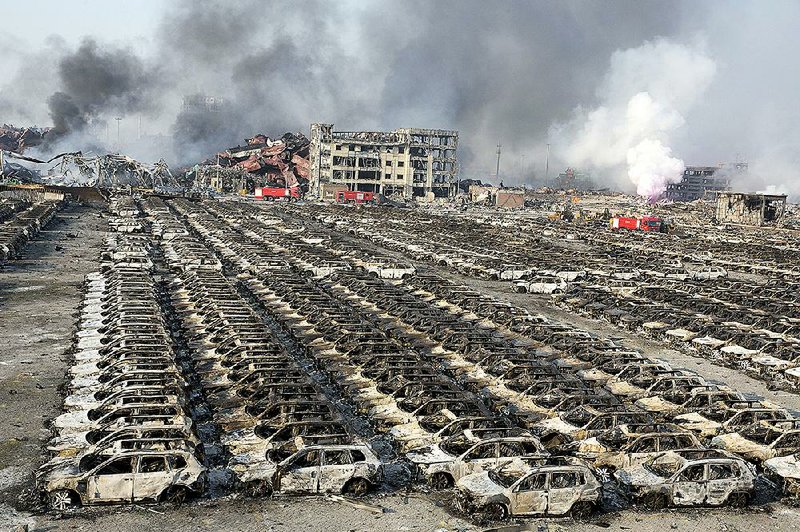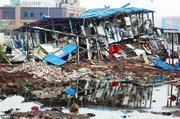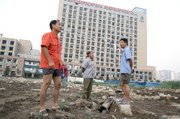TIANJIN, China -- The death toll from the fiery explosions at a warehouse of hazardous chemicals climbed Thursday to 50, and the Chinese government sent experts to the shattered and smoldering port to assess any environmental dangers from the spectacular blasts.
More than 700 people were injured and dozens were reported missing in the explosions shortly before midnight Wednesday that demolished a workers' dormitory, tossed shipping containers and turned a fleet of 1,000 new cars into scorched metal remains. Miles away, windows had been shattered by the shock waves.
There was no indication of what caused the disaster in one of China's busiest ports, and authorities tried to keep a tight rein on information, keeping reporters away from the scene.
More than 1,000 firefighters and 151 fire engines were sent to the mostly industrial zone in Tianjin, a petrochemical processing hub about 75 miles east of Beijing.
Tianjin is the 10th-largest port in the world by container volume, according to the World Shipping Council, and the seventh-biggest in China. It handles vast amounts of metal ore, coal, steel, cars and crude oil.
Ships carrying oil and "hazardous products" were barred from the port Thursday, the Tianjin Maritime Safety Administration said on its official short-message blog. It also said vessels were not allowed to enter the central port zone, which is near the blast site.
The municipal government, which gave the death toll of at least 50, said 701 people were injured, including 71 in serious condition. At least 12 of the dead were firefighters who had responded to earlier reports of a blaze at the chemical storage site. Hundreds of people lined up to donate blood to area hospitals.
Rescue workers continued to comb the rubble for bodies.
The Tianjin Port Group Co. said dozens of its employees were unaccounted for and a search is underway, though some workers at the port may not be documented.
On Thursday afternoon, fires at the site continued to produce a steady cloud of smoke. Tianjin officials, citing the unknown nature of the chemicals, decided to let the blazes burn out on their own. A team of experts will survey hazardous materials at the site, assess dangers to the environment and decide how best to proceed.
The state news media also reported that a military team of specialists in handling chemicals had been sent to Tianjin.
Authorities said the blasts started at a warehouse owned by Ruihai International Logistics Co., a company that says it stores hazardous materials including flammable petrochemicals, sodium cyanide and toluene diisocyanate. The company was also licensed to handle highly combustible substances such as compressed and liquefied natural gas.
An initial explosion apparently triggered an even bigger one. The National Earthquake Bureau said the first blast was the equivalent of 3 tons of TNT, and the second 21 tons.
State media said senior management of the company had been detained and that Chinese President Xi Jinping vowed severe punishment for anyone found responsible for the explosions.
The devastation was worst in the port area, a sparsely populated expanse of warehouses and parking lots.
At least five mid-rise buildings appeared to have been destroyed.
"I thought it was another 9/11," said George Cai, a native of nearby Hebei province living about 2 miles from the scene of the explosions who went to survey the damage. Like many other curiosity seekers, at least initially, he was able to get within about 1,000 feet of the scene. "It was like something out of a Hollywood action movie, like Godzilla."
Experts have set up several air-quality monitors to check for toxins and, according to official pronouncements, declared the air safe to breathe. Favorable winds on Thursday pushed most of the toxic plume out to sea.
In a news conference broadcast live by state-run CCTV, Wen Wurui, head of the Tianjin's Environmental Protection Bureau, said there had been no apparent impact on air-monitoring stations but that water samples were still being examined.
"The pollution will mostly spread to the Bohai Sea, and it will have no effect on Beijing," he said, referring to waters east of Tianjin.
When a reporter asked him whether the chemicals at the warehouse had been stored far enough away from residences, Wen seemed at a loss for a response, and the broadcaster cut away from the briefing, only to return to it later.
Residents of Tianjin's Binhai district, frustrated by the lack of reliable information, said they were unsure whether the air was safe, and many people continued to wear disposable face masks throughout the day.
"Right now we don't know anything," said Sun Meirong, 52, an office cleaner who trudged down 13 flights of stairs to safety with her 1-year-old grandson after the explosions blew in the windows and front door of her apartment.
Mile no-go zone
Police kept journalists and bystanders away with a cordon about a mile from the site. Social-media users complained their posts about it were deleted.
On China's Weibo short-message blog platform, some users said their posts about the blasts were deleted, and the number of searchable posts on the disaster fluctuated. For much of the day, Tianjin's main news channel played Korean soap operas.
The Tianjin Internet Police, on their official blog, warned social-media users to stick to official reports about the number of dead and injured, saying that there would be "zero tolerance for creating rumors."
Photos taken by bystanders and circulating online had shown a fireball high in the sky with a mushroom cloud. Other photos on state media outlets showed a sea of fire that painted the sky bright orange, with tall plumes of smoke.
The website of the logistics company became inaccessible.
The Tianjin government said that because of the blasts it had suspended online access to public corporate records. It was not clear whether the digital blackout was due to technical damage related to the explosion. No one answered the phone Thursday at the Tianjin Market and Quality Supervision Administration or the Tianjin Administration for Industry and Commerce.
Ruihai International Logistics said on its website -- before it was shut down -- that it was established in 2011 and is an approved company for handling hazardous materials. Its facility in Tianjin covered about half a million square feet and included several warehouses. It said it handles 1 million tons of cargo annually.
In a statement Thursday, Greenpeace warned that many of the substances Ruihai was reported to handle posed worrying threats to human health. It said that sodium cyanide, a compound used in mining, is especially toxic, while toluene diisocyanate, used to make of polyurethane products, is a carcinogen and highly explosive.
With rain forecast for today, Greenpeace warned about the danger of airborne pollutants seeping into groundwater.
More than a mile from the explosion scene is a luxury apartment complex on a road strewn with broken glass and pieces of charred metal thrown from the explosion. Like surrounding buildings, the Mediterranean-style complex had all its windows blown out, and some of its surfaces were scorched.
"It's lucky no one had moved in," said a worker on the site, Liu Junwei, 29. "But for us, it's a total loss. Two years of hard work down the drain."
"It had been all quiet, then the sky just lit up brighter than day, and it looked like a fireworks show," said another worker on the site who gave only his surname, Li.
Tianjin, with a population of about 15 million, is being promoted by the Chinese government as a center for finance and high-tech industry. The Tianjin Economic Development Area has attracted foreign investors including Motorola, Toyota, Samsung and Novozymes.
The port has grown in importance as companies wanting lower manufacturing costs have migrated to the north from eastern and southern China's manufacturing centers.
In the U.S., the White House sent its condolences, with spokesman Ned Price calling the explosions a tragedy and praising the first responders working to help the injured.
Information for this article was contributed by Christopher Bodeen, Ian Mader, Didi Tang, Joe McDonald, Erika Kinetz and Josh Lederman of The Associated Press; by Andrew Jacobs, Yufan Huang, Patrick J. Lyons and Rick Gladstone of The New York Times; and by Julie Makinen, Jonathan Kaiman, Tommy Yang and Nicole Liu of the Los Angeles Times.
A Section on 08/14/2015




